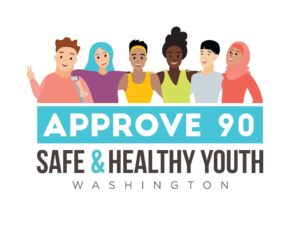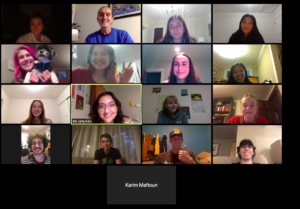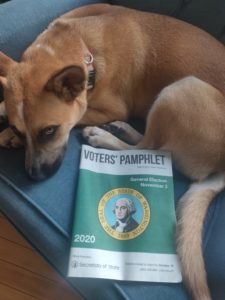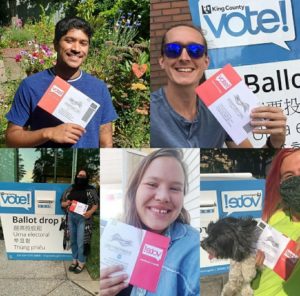
by Bus Admin | Oct 30, 2020 | Uncategorized
You probably don’t need many more reasons to convince you that the 2020 election is SUPER important. But while you’re here, let me tell you about a really important issue on your ballot here in Washington: comprehensive sex education. 
Referendum 90 (“R90”) is our opportunity to weigh in on a law that Washington lawmakers passed earlier this year. The law requires school districts to teach comprehensive, age-appropriate and inclusive sexual education. The curriculum varies significantly by grade, of course, but there are state standards for all K-12 students. This law will only go into effect if Washington voters (like you!) vote to APPROVE Referendum 90. Here are ten reasons why you should be pumped to support Referendum 90 on your ballot:
- Quality sex ed keeps young people safe. Young people who get a comprehensive sex education are less likely to engage in risky sexual behavior, contract a sexually transmitted infection or have an unintended pregnancy. These are serious things and helping young folks avoid them is a big deal.
- R90 requires age appropriate education throughout K-12. Starting early means more time to learn, grow and understand important issues. Under R90, students in kindergarten and early grades focus on social-emotional learning. As students get older, the curriculum transitions to more mature and age appropriate topics covering sexual health, consent, STIs, and other topics.
- We NEED to teach young people about consent. Sexual assault and sexual violence are huge issues across our country, and especially among young people. Teaching youth the importance of consent, how to respect boundaries, how to ask for consent and how to understand withdrawing consent is a huge step in the right direction. This is a really important part of R90’s curriculum. R90 also includes lessons on bystander training and intervention.
- Our education needs to include LGBTQ+ youth in positive ways. Approving R90 means LGBTQ+ youth will be reflected positively in sexual health education. This is a valuable and impactful way to make our educational system more inclusive and to widen acceptance and respect among teachers and peers.
- R90 promotes racial equity. Students of color experience stigma and harmful stereotypes throughout our education system, and sex education is no different. Schools that teach disproportionately Black and Brown students are more likely to use abstinence-only education. Furthermore, students of color often experience increased societal stigma against their sexual freedom.
- Children at risk of abuse need a way to ask for help. R90 will keep children safer from abuse. Children who are being sexually abused often don’t understand what is happening until they are provided with the tools and language to communicate the situation with a trusted adult.
- This is about expanding access, not mandating it. Our community is safest and strongest when everyone has access to these lessons. That being said, R90 still allows parents to opt their children out of lessons if they choose to. This isn’t a state mandate, but rather an important expansion of access to critical lessons, information and growth.
- A ton of dope community orgs support R90! When our most trusted community organizations rally together to support a cause, you know it’s serious. R90 is endorsed by Washington Student Association, ACLU of Washington, Planned Parenthood, King County Sexual Assault Resource Center, Gender Justice League, Disability Rights Washington, Justice for Girls Coalition of Washington State, Northwest Progressive Institute, Sexual Violence Law Center, Washington State Association of School Psychologists and many others!
- Direct democracy is super cool and your voice matters. This one is a bit nerdy, but honestly who cares! We’re lucky to be in Washington where we have a lot of opportunities to weigh in on really, really big policies and issues as VOTERS. Every voter in Washington has the chance to support (or oppose) Referendum 90. A lot of states don’t work like this! We don’t need to call our lawmakers, go to Olympia, lobby, or anything like that. We vote. And if we vote to approve R90, young folks for generations to come will benefit from our decision to support sex ed!
- The Bus LOVES R90! It’s true! We’ve been working hard to get the vote out for R90 and remind young folks of why this referendum is SO important. Just the other night we texted over 25,000 young folks in one night about R90 (see pic below). If you’ve read this far, you’re probably a fan of the Bus and we think you should be a fan of R90 as well 🙂


by Bus Admin | Oct 21, 2020 | Uncategorized, Voter Registration, Voting
Leila is the Communications and Outreach Coordinator at the Bus. She’s passionate about making sure voting works for all of us.
Are you a new voter? Does everyone keep telling you to vote, but then forgetting to give you the details? ( We see you Facebook, Snapchat, and every Insta influencer ever). You’ve come to the right place. Let’s break it down.
How do I get registered to vote?
Registering to vote is *easy* in Washington State. You can do it online, with a Washington State ID, or in person (you’ll need a valid form of ID, like your social security card). Register online up until 8 days before election day, at www.registerinwa.org. This election season, that means the deadline is October 26th. If you’d like to check if you’re registered, or update your address, you can visit the voter portal at www.votewa.gov. In Washington, you can register in person all the way up to election day at a vote center. On election day, we have same day registration and voting, meaning you can go to a vote center, get registered, and vote, all in the same day.
Side note… where are the Vote Centers? And what can I expect if I visit one?
Vote centers are available across Washington to register new voters, update current voter records, obtain a voter registration card and to provide assistance to voters who need help completing their ballot. Trained staff and specialized equipment are available to help voters with disabilities cast a private, independent ballot. Each county has at least one Vote Center, which is often the elections office. Many counties also open additional Vote Centers when ballots drop, which is 18 days before election day (Oct 16th this year!). Those hours might vary. You can google “Washington State Vote Centers”, or “King County Voter Centers”, if you live in King County. Your county’s election department website will let you know location and hours.
Am I eligible to vote?
In order to register or pre-register to vote, you need to be 16 years old and a US Citizen, living in Washington State. Sixteen and 17 year olds can pre-register, meaning you’ll automatically be registered to vote when you turn 18.
Ok, I’m registered to vote. Where’s my ballot?
In Washington State, we ALL vote by mail. This means that your ballot will come to the address on your voter registration 18 days before the election. The Secretary of State’s website always has these dates easily available, by the way, so check them out: www.sos.wa.gov. This is why it’s so important to check that your voter registration lists your current address, and update it if not! Again, you can do that at votewa.gov, or at a Vote Center. Did you miss the deadline to update your address, and really don’t want to go to a vote center? The voter portal (again, www.votewa.gov) let’s you print out your ballot. You can also track your ballot there, so you can see when it was sent to you, and when you return it, you can check if it was counted.
I got my Ballot. IT IS SO LONG. How do I figure out what to vote for?

Even pets like the Voter’s pamphlet.
You are right. It is long. In Washington State, we sometimes have up to SEVEN elections a year, depending on where you live, and the ballot can be three pages long, or more. Every voter gets sent a voter pamphlet by the Secretary of State, contains an explanation of the positions up for election on the ballot, and statements from each candidate. For referendums and initiatives, it contains an official explanation and a statement from each campaign stating why they think you should vote no, or yes.
Looking for more info? Another thing to do is check out voter guides. Local newspapers do voter guides and endorsements, issue based organizations do voter guides, and you could even check out local activists and media folks on social media. Fuse does a progressive voters guide, and issue based organizations like Washington Conservation Voters ( who are all about voting in green candidates) release a list of endorsements. The Washington Bus does the same. These are kind of like a cheat sheet – if you think that the organization that released the voter guide represents your values, it can be a good sign if they endorse your candidate or ballot measure. It’s always a good idea to check out several, and do your own research if you have time.
Depending on the year, you could be voting for representation at the federal level, like President, and at the state level, like your Governor and your state Senator. We vote at the county level for your County Executive (like the mayor of your county) and your county council representatives, and at the city level, for Mayor. You could vote for your School Board Representative, who controls so much about how education is funded and implemented, or your City Council-member, who passes municipal laws and helps control how city taxes are spent. Judges control how the criminal justice system is enforced, and can have huge influence on the school to prison pipeline.
Ballot measures are piece of proposed legislation which voters decide on. They are sometimes about implementing a local tax for specific funding, or they could be about implementing a law. Proposition 1, which is on the Seattle Ballot, implements a sales tax to fund public transportation (whoooo Buses!). Referendum 90 asks voters to decide whether comprehensive sex education should be implemented in K-12 schools.
The bottom line is, you don’t have to vote for everything on the ballot – it’s your ballot. However, these local officials and local ballot measures often impact our daily lives so much – everything from whether your community has good public transportation, to if local businesses thrive, to testing requirements in schools. If you’re wondering who these elected officials are, because you’ve never heard of them – that could be a red flag. How much outreach are they doing to your community? Are they passing laws that benefit you and your neighbors? Making sure you vote with your values is the best way to change how local government works and who it represents.
Alright, I filled out my ballot. Are you sure it will be counted?
Heck yeah! You’re on it. Your ballot needs to be filled out in black or blue pen, and you need to make sure it is signed. Your signature needs to match either the signature on your driver’s license or ID, or the signature on your voter registration. Making sure your phone number or email is on your voter registration gives your county elections department a chance to contact you if for some reason your ballot gets flagged because your signature doesn’t match. You can add that information at the voter portal (votewa.gov), or go to a vote center to update your signature.
How do I turn in my ballot?
You can either put your ballot in the mail, no postage required, or put it in a ballot drop box. Every county has a map of where drop boxes are located. For King County, that map is here, and for Pierce County, that map is here. Often they are located at local community centers, libraries, on college campuses, etc.
You need to make sure your ballot is postmarked by Nov 3rd (election day) (meaning the post office received it and marked it as received that day) or put it in a Ballot drop box by 8pm Nov 3rd.
Ok, I did it. That was stressful. How can I make it more fun?

Washington Bus Staff and Friends, getting their vote on!
Call your friends! Do it together (over facetime? #pandemictimes). Get your neighbors to walk to your local ballot box together. Voting is something that our whole community can be a part of – even if you’re not eligible to vote – by reminding and educating each other about the importance of voting in every election.
Congratulations, you did it. Now go remind three friends to vote. You’re amazing for making it through and adding your voice to the ballot box.
Other good things to know:
- Folks with felonies can vote in WA. You need to re-register, and you have to no longer be in community custody (under the authority of the Department of Corrections, or on parole). Check out more details on the SOS website, here.
- Voting with a disability? Accessible Voting Units are available at each Vote Center. Find out more here. You can request reasonable accommodation from the Elections office, according to the Americans with Disabilities Act.






